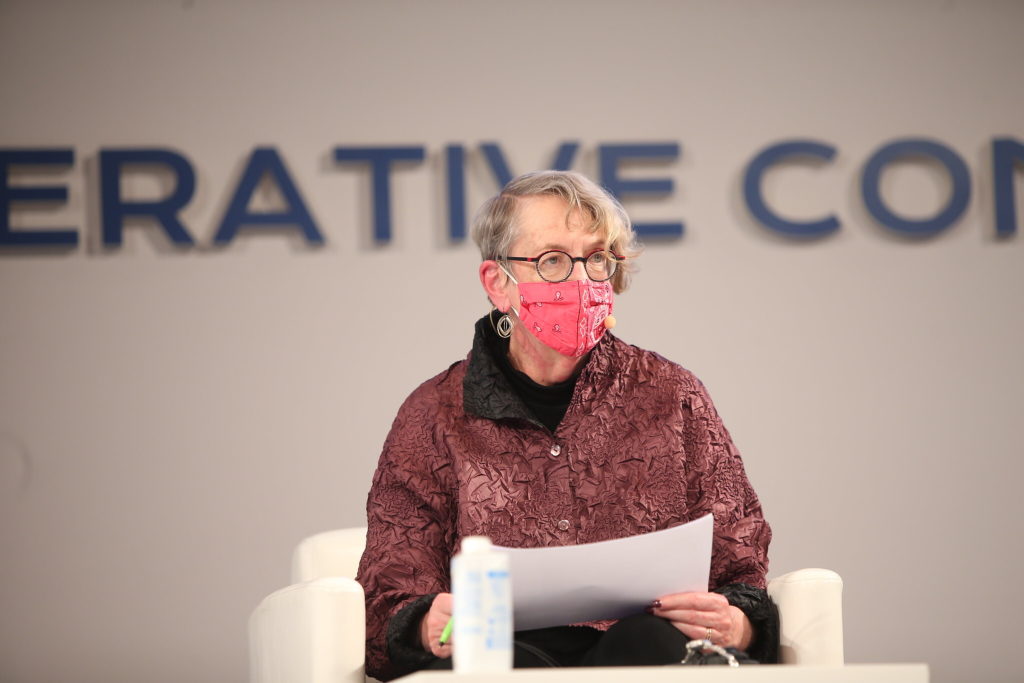
A plenary session was held on the afternoon of 1 December in order to summarise sessions centred around the first key theme of Congress: Examining Our Cooperative Identity. Consumer cooperative specialist Ann Hoyt chaired the session with six rapporteurs who had been tasked with attending each session that had taken place to gather key themes and ideas.
To begin, Director of International Relations at the National Cooperative Union of India, Savriti Singh, offered highlights of the opening plenary and roundtable on Examining Our Cooperative Identity. Ms Singh highlighted the point made by Korean Minister of Agriculture, Food and Rural Affairs, Youngbum Park in his speech, that cooperatives originate during crises, as in the 1997 Korean economic crisis, as well as how important partnerships with governments are for cooperative development. From the roundtable discussion, Ms Singh highlighted the crucial role of women and young people in the cooperative movement, as well as the suggestion from members of the panel that cooperatives must be prepared to focus on SDGs and renewable energy to stay relevant.
Reporting from the parallel session on Examining Our Cooperative Identity Through a Strong Cooperative Brand, Managing Director of DotCooperation LLC Violetta Nafpaktiti shared key tools that coops have to communicate their brand, including the .coop domain and the ICA’s worldwide cooperative logo. Ms Nafpaktiti said that while the panellists in her session were from a diverse range of sectors, what they had in common was pride in their cooperative identity that they feel creates trust and differentiates them from other types of businesses. Specifically relating to the subject of the cooperative identity, Ms Nafpaktiti said it was a “no-brainer to use these tools, that show that we are a strong movement worldwide”.
Reporting back from the parallel session on Examining Our Cooperative Identity Through Inclusive Governance was Doug O’Brien, President and CEO of NCBA CLUSA, who said that in his session he had noticed clear connections to the cooperative values of democracy, equality, equity and solidarity as well as the first, second and seventh cooperatives principles all showing the need for inclusive governance. It was noted that not having inclusive governance negatively impacts both the social and business dimensions of cooperativess, and that there is a lot more to be done by coops in creating truly inclusive governance that includes the diversity of those in the communities coops aim to serve.
Shivali Sarna, ICA’s Asia and Pacific Communication and Membership Development Officer, fed back from the session on Examining Our Cooperative Identity Through Educational Opportunities that there needs to be more cooperative education for young people, and that this should be a lifelong process that people practice as life skills.
Hyunwoo Kim, from the Korean National Agriculture Cooperative Federation, reported back on the session on Examining Our Cooperative Identity Through Partnerships With Governments. He shared the consensus from the panel that while partnerships with governments are important for coops, they also need to be mindful of the issue of government control and intervention, and that countries with less developed partnerships between cooperatives and governments can learn from best practices around the world.
The final parallel session, on Examining Our Cooperative Identity Through Cooperative Culture and Cultural Heritage was reported on by ICA’s Director of Legislation Santosh Kumar, who highlighted the importance of their conversation for two reasons: the first being that the cooperative movement has not yet fully seized the opportunity presented by the 2016 UNESCO recognition of cooperatives as an Intangible Cultural Heritage of Humanity, and secondly, that coops have not yet optimised the element of culture mentioned in the 1995 Statement of Cooperative Identity.
Towards the end of the session, Mr Kumar responded to a point made about culture being the sum of our values and behavior, with the suggestion that we can view identity as the sum of our experiences. He went on to put forward the idea that in order to fully examine our cooperative identity, we must understand the diversity of experience within the cooperative movement across the world in order to “distill an identity which is relevant to the 21st century”.
